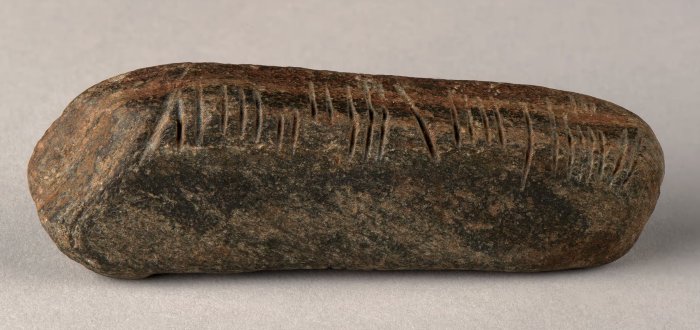Jan Bartek - AncientPages.com - Graham Senior, a geography teacher, was tidying his garden when he suddenly discovered a mysterious ancient Ogham stone in Coventry.
This particular stone, measuring 11cm in length, features several horizontal incisions along its side. When Senior shared photographs of the rock with the Portable Antiquities Scheme, they confirmed that the markings were indeed ogham inscriptions dating back over 1,600 years.
Ogham was an Early Medieval alphabet used primarily for writing in the early Irish language. It predated the use of manuscripts made from vellum.
The Ogham stone, 11cm long and weighing 139g, was found in an overgrown garden in Coventry. Credit: The Herbert Art Gallery and Museum
Ogham is a unique writing system consisting of parallel lines in groups of 1-5, making it highly unusual among world writing systems. These stones provide valuable insights into the Irish language before the adoption of the Latin insular script.
The earliest known ogham inscriptions date back to the 4th and 6th centuries AD, and over 400 ogham stones and fragments have been found, predominantly in Ireland and along the Welsh coast. While the main function of these stones is still uncertain, some historians believe they were used for legal purposes in land disputes, as they are often found on or near the boundaries of kin and bearing the names of ancestors.
This remarkable discovery in Coventry highlights the importance of preserving and studying these ancient artifacts, as they offer a glimpse into early Irish civilization's rich cultural and linguistic heritage.
"I found the stone while I was gardening during the lockdown in May 2020. It caught my eye as I was clearing an overgrown part of the garden. At first, I thought it was some kind of calendar. Finding out later it was an ogham stone and over 1,600 years old was incredible. I was just clearing a flowerbed of weeds and stones when I saw this thing and thought, that’s not natural, that’s not scratchings of an animal. It can’t have been more than four or five inches below the surface," Senior said.
Carving of Ogham letters into a stone pillar - illustration by Stephen Reid (1873 - 1948), in: Myths & Legends of the Celtic Race by T. W. Rolleston (1857 - 1920), published 1911, p. 288. source
Coventry, situated in the West Midlands region of central England, is an unlikely location for the discovery of an ancient Ogham artifact. Researchers are perplexed by how this stone ended up in a residential garden in the city. One plausible theory suggests that the stone was transported by monks during the Middle Ages. These religious figures frequently relocated from one monastery to another, and it is conceivable that they brought the stone to England. However, this small stone's original purpose or function remains an enigma that puzzles researchers.
Credit: Roses_Street - Pixabay - Public Domain
"It could have been a portable commemorative item. We don’t know. It’s an amazing little thing," Teresa Gilmore, an archaeologist and finds liaison officer for Staffordshire and West Midlands based at Birmingham Museums, said.
Explaining its inscription, “Maldumcail/ S/ Lass”, Gilmore said: “The first part relates to a person’s name, Mael Dumcail. The second part is less certain. We’re not sure where the S/ Lass comes from. It is probably a location. So something like ‘had me made’.”
The Herbert Art Gallery and Museum has announced that Coventry’s Ogham Stone will be displayed alongside hundreds of other artifacts at the ‘Collecting Coventry’ exhibition, which will showcase 75 years of collecting efforts in the city.
Graham Senior, finder of the stone, with Ali Wells, exhibition curator at the Herbert Art Gallery and Museum in Coventry. Credit: The Herbert Art Gallery and Museum.
"I was delighted when Graham offered to donate his incredible find to the museum. As the Herbert only collects in the city of Coventry boundary it’s rare that someone finds something a nationally significant as the Ogham stone. It is really quite incredible. The language originates from Ireland. So, to have found it within Coventry, has been an exciting mystery. Coventry has been dug up over the years, especially the city center, so there are not that many new finds. It was quite unexpected.
We might never know how Mael lost the stone and how it ended up in a garden in Coventry, but I hope future research will reveal more about its story. Visitors can see it on display in (upcoming/new exhibition) ‘Collecting Coventry’ until 27 April 2025. There are also 3d replicas of the stone as it was the first object to be scanned by our Media team," Ali Wells, Curator at Herbert Art Gallery and Museum, said.
Written by Jan Bartek - AncientPages.com Staff Writer
Expand for references







